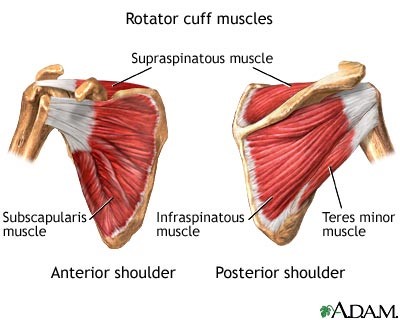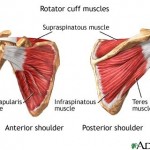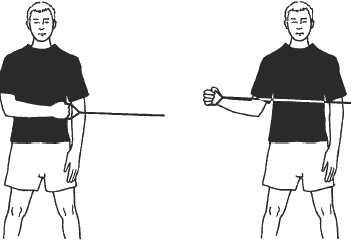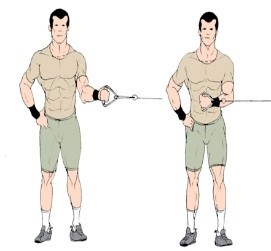
Torn Rotator Cuff, Mike Golemba, PTA, Total Health Systems of Macomb County
What is a torn rotator cuff? Basically it is a tear of one or more of the four rotator cuff tendons or muscles. A rotator cuff injury may include any type of irritation or damage to the rotator cuff muscles or tendons that will cause pain and weakness in the shoulder. 
The funcion of the rotator cuff provides stability and helps center the humeral head in the joint socketto the shoulder. The muscles of the rotator cuff allow the shoulder to rotate with movements such asexternal rotation(Figure-A) and internal rotation(Figure-B).
The tendons of the rotator cuff, not the muscles are the most commonly involved. Of the four muscles of the rotator cuff the supraspinatus muscle is the most frequently damaged. The reason for this is because it ties right underneath the acromion which is a very tight space. The primary function of the supraspinatus muscle is abduction and shoulder stabilization.
There are two types of tears you can have on the rotator cuff. One is a partial tear where the tear damages the soft tissue, but does not completely sever it. The second is a full thickness tear where it splits the soft tissue into two pieces. In many cases, tendons tear off where they attach to the head of the humerus. Generally a full thickness tear will require surgery.
There are two main causes of rotator cuff tears: Injury and Degeneration.
Acute Tear:(injury)This can happen if you fall down on your outstretched arm or lift something to heavy with a jerking motion and you can tear your rotator cuff. This kind of tear can occur with other type of shoulder injuries such as a broken collarbone or a dislocated shoulder.
Degenerative Tear: Most tears happen from the wearing down of the tendon that happens over a period of time. This degeneration happens naturally as we age. There are several factors that contribute to this type of tear such as repetitive motion. Repeating the same motion can stress the rotator cuff. Overhead athletes such as basketball, tennis, baseball, and volleyball players are some examples of athletes that are at risk. Many jobs and routine chores can cause degeneration such as carpenters and painters. Also a lack of blood supply. As we get older the blood supply lessens in the tendons of the rotator cuff. Without a good blood supply healing is decreased and can lead to a tear.
If you have symptoms such as pain with laying on that shoulder, pain with lifting and lowering your arm, weakness when lifting or rotating your arm and crepitus or crackling sensation when moving your shoulder. Tears that happen suddenly, such as from a fall usually cause intense pain. There even might be a snapping sensation and immediate weakness in your arm. If you have any of these symptoms you should see a doctor for an examination.
There are several ways to treat the shoulder with these symptoms depending on the type of and degree of the tear.
1. Rest: The doctor may suggest rest and limiting overhead activities.
2. Non-Steroidal anti-inflammatory medication: Drugs like ibuprofen and naproxen to help reduce pain and swelling.
3. Physical Therapy: Specific Exercises to help restore movement and strength to the shoulder. Other treatment may include electrical stimulation, stretching, heat and or ice and hands on treatment for the shoulder.
4. Steroid Injection: if rest, NSAID’s, Physical Therapy does not seem to be helping then an injection of a cortisone into the shoulder may be used to help with inflammation and pain.
5. Surgery: Your Doctor may suggest surgery if your symptoms do not improve with nonsurgical treatment or if a large tear or a complete tear of the rotator cuff is found.
The mistake patients make is they keep using the arm in a repetitive motion and fighting through the pain or just waiting to long before seeing the Doctor right away which may lead to causing more damage to the shoulder and a longer recovery time.


